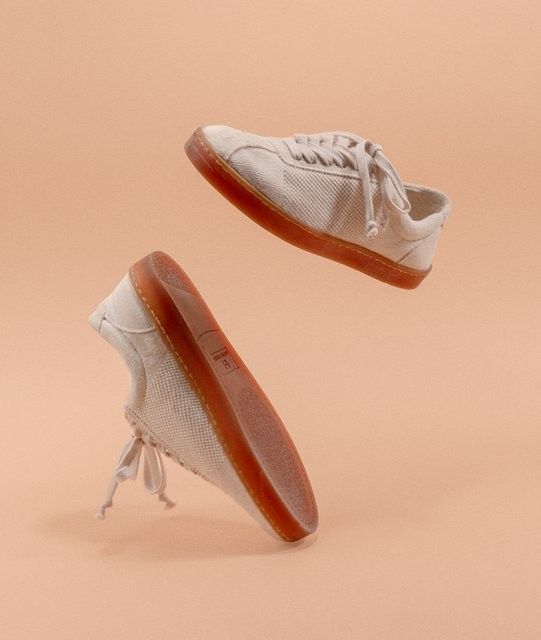
Have you ever looked at your shoes and wished they were made of pineapple husks? I know I have – and now Canadian shoe manufacturer, Native Shoes, is making that dream a reality.
The company has the ultimate goal of making products that are not only recyclable but generate zero waste – ‘something that was born from the earth and could go back to it’. These shoes are their first steps towards that goal.
Made from a mix of entirely vegan-friendly ingredients such as eucalyptus, pineapple husk, and hevea (rubber plant) milk, the shoes are entirely bio-degradable and, thus, are fully compositable. This dedication to the cause meant the company had to change the way they built the shoe, as typical adhesives weren’t used in its construction, and a whole new proprietary material was created for the upper sole in a collaboration with Pinatex, an alternative textiles manufacturer that (incredibly) specialises in pineapple-based materials.
Annually, the US is purported to throw away over 300 million pairs of trainers – waste that is incredibly hard to reuse due to the nature of the materials used in their construction. Statistics like these are what propel companies like Native Shoes to action; in an attempt to stop unnecessary waste and pollutants.
In a similar vein, IKEA is due to launch a range of home accessories made from rice straw, a waste product of rice farming that is typically burnt by farmers to clear space for the new crop.
The focus here is on Northern India where the issue of pollution is presented on a scale disproportionate to the rest of the world. Northern India has nine out of 10 of the most polluted cities in on Earth, in part, due to the burning of crops and improper disposal of waste.
IKEA hopes to combat this and is actively buying up rice grain waste to manufacture products alongside its current suppliers in the region. The waste is then combined with other materials, such as waste fabric, to create a pulp which is then formed and weaved into a variety of rugs and lamp shades.
The process has not (and likely will not) become industrialised, due to the small nature of the supply chain, meaning that each product will be unique and actually hand made by a real human being.
The trade off, expectedly, with both these products, is that they will set you back a hefty chunk of cash. You can expect to pay £205 for a pair of the Native Shoes and, although prices haven’t yet been announced for the IKEA range, the artisan nature of the products will likely command a high-end price tag.
But this is the nature of pioneering techniques and products. The first products to do something are always the most expensive, but it is imperative that companies such these keep pushing the ball forward for more sustainable methods of manufacturing. The slow but steady churn of capitalism is likely our best bet at combatting climate change.
According to the company, the US alone throws away at least 300 million pairs of shoes each year, and most end up in landfill. Sneakers are the worst waste culprit, made up of mostly plastic or chemically treated materials that make them impossible to break down.